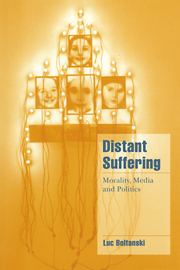
-
Select format
-
- Publisher:
- Cambridge University Press
- Publication date:
- 22 September 2009
- 13 October 1999
- ISBN:
- 9780511489402
- 9780521573894
- 9780521659536
- Dimensions:
- (228 x 152 mm)
- Weight & Pages:
- 0.56kg, 266 Pages
- Dimensions:
- (228 x 152 mm)
- Weight & Pages:
- 0.44kg, 268 Pages
- Subjects:
- Sociology: General Interest, Sociology
You may already have access via personal or institutional login- Subjects:
- Sociology: General Interest, Sociology
Book description
Distant Suffering, first published in 1999, examines the moral and political implications for a spectator of the distant suffering of others as presented through the media. What are the morally acceptable responses to the sight of suffering on television, for example, when the viewer cannot act directly to affect the circumstances in which the suffering takes place? Luc Boltanski argues that spectators can actively involve themselves and others by speaking about what they have seen and how they were affected by it. Developing ideas in Adam Smith's moral theory, he examines three rhetorical 'topics' available for the expression of the spectator's response to suffering: the topics of denunciation and of sentiment and the aesthetic topic. The book concludes with a discussion of a 'crisis of pity' in relation to modern forms of humanitarianism. A possible way out of this crisis is suggested which involves an emphasis and focus on present suffering.
Contents
Metrics
Altmetric attention score
Full text views
Full text views help Loading metrics...
Loading metrics...
* Views captured on Cambridge Core between #date#. This data will be updated every 24 hours.
Usage data cannot currently be displayed.
Accessibility standard: Unknown
Why this information is here
This section outlines the accessibility features of this content - including support for screen readers, full keyboard navigation and high-contrast display options. This may not be relevant for you.
Accessibility Information
Accessibility compliance for the PDF of this book is currently unknown and may be updated in the future.


